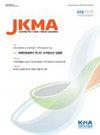Biological products in allergy practice: the beginning of a new era
IF 0.5
Q3 MEDICINE, GENERAL & INTERNAL
引用次数: 0
Abstract
Background: Recently, the treatment of allergic diseases has significantly progressed with the development and increased use of biological products (BPs) or molecularly targeted drugs. Based on cases with asthma, using BPs in allergic diseases has expanded to include chronic rhinosinusitis with nasal polyps, atopic dermatitis, and chronic spontaneous urticaria.Current Concepts: BPs are effective in treating severe allergic diseases, which often have limitations with current treatments and limited therapeutic options available. The added efficacy of BPs includes reduced risk of side effects from using systemic corticosteroids. Additional to transforming clinical care, BPs have provided insights into disease mechanisms and identified biomarkers to predict therapeutic responses. This has opened a new era towards personalized and precise treatment.Discussion and Conclusion: BPs for patients with severe asthma reduce symptoms and risks of exacerbations. Because of these observations, whether the remission of allergic diseases can be achieved by BPs has been pondered. Another agonizing problem is that BPs are expensive and many patients require prolonged administration for disease control. As more BPs become available, costs will likely decrease, leading to their more widespread use. Indeed, a new era in the treatment of allergic diseases has begun.生物制品在过敏实践中的应用:一个新时代的开始
背景:近年来,随着生物制品(bp)或分子靶向药物的发展和使用的增加,变态反应性疾病的治疗取得了显著进展。在哮喘病例的基础上,使用bp治疗过敏性疾病的范围已经扩大到包括慢性鼻窦炎伴鼻息肉、特应性皮炎和慢性自发性荨麻疹。目前的概念:bp在治疗严重过敏性疾病方面是有效的,目前的治疗方法和治疗选择有限。bp的额外功效包括降低使用全身皮质类固醇的副作用风险。除了改变临床护理,bp还提供了对疾病机制的见解,并确定了生物标志物来预测治疗反应。这开启了个性化和精准治疗的新时代。讨论和结论:bp治疗严重哮喘患者可减轻症状和恶化风险。由于这些观察结果,人们一直在思考bp是否可以缓解过敏性疾病。另一个令人苦恼的问题是,bp价格昂贵,而且许多患者需要长期给药以控制疾病。随着越来越多的bp可用,成本可能会降低,从而导致其更广泛的使用。事实上,过敏性疾病治疗的新时代已经开始。
本文章由计算机程序翻译,如有差异,请以英文原文为准。
求助全文
约1分钟内获得全文
求助全文
来源期刊

Journal of The Korean Medical Association
Medicine-General Medicine
CiteScore
0.50
自引率
0.00%
发文量
84
审稿时长
4-8 weeks
期刊介绍:
The Journal of the Korean Medical Association (JKMA) is the official peer-reviewed, open-access, monthly journal of the Korean Medical Association (KMA). It contains articles in Korean or English. Its abbreviated title is ''J Korean Med Assoc''. The aims of the Journal include contributing to the treatment of and preventing diseases of public health importance and to improvement of health and quality of life through sharing the state-of the-art scientific information on medicine by the members of KMA and other national and international societies.
 求助内容:
求助内容: 应助结果提醒方式:
应助结果提醒方式:


